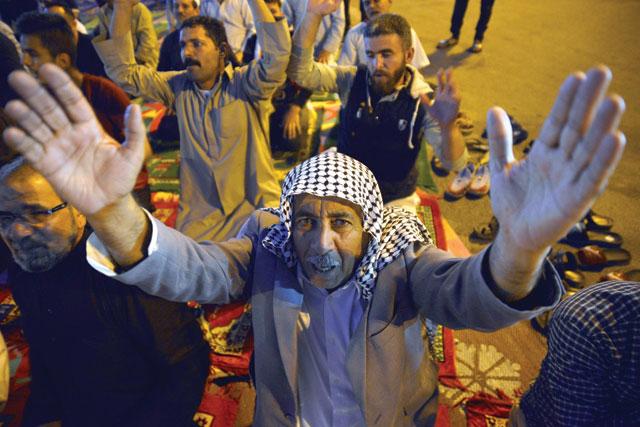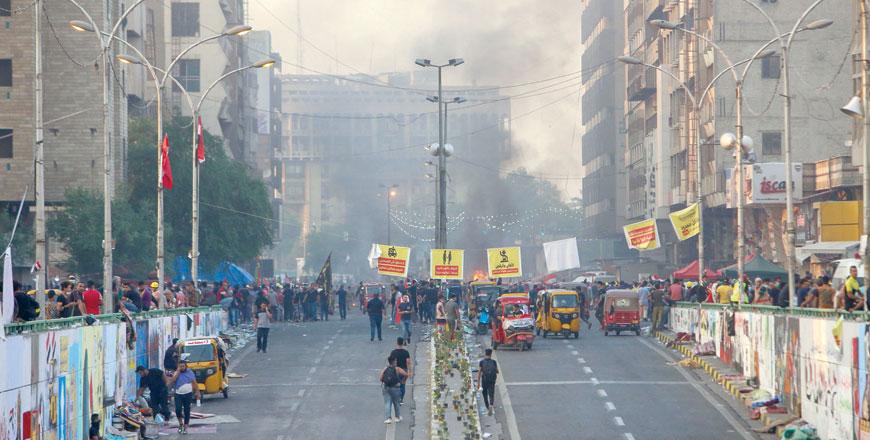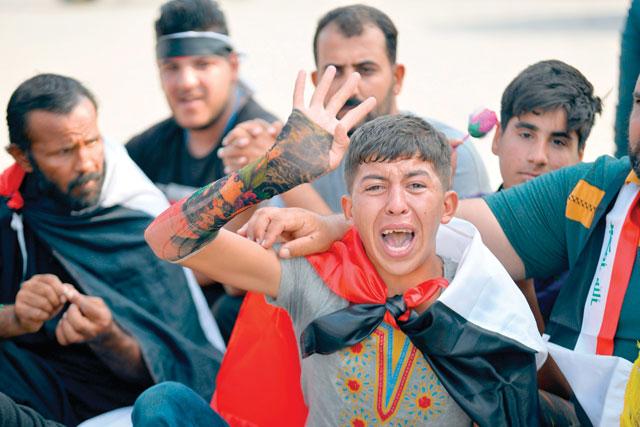You are here
Iraqis keep up sit-ins amid fears of 'bloodbath'
By AFP - Nov 10,2019 - Last updated at Nov 10,2019

An Iraqi protester takes part in collective prayers during ongoing anti-government demonstrations in the central Shiite holy shrine city of Najaf on Sunday (AFP photo)
BAGHDAD — Iraqi anti-government protesters clashed with security forces and kept up their sit-ins Sunday, as a rights group warned a deadly crackdown could spiral into a "bloodbath".
Mass rallies calling for an overhaul of the ruling system have rocked the capital Baghdad and the Shiite-majority south since early October, but political forces closed ranks this week to defend the government.
The consensus seems to have paved the way for a crackdown, and 12 protesters were killed on Saturday when security forces cleared out protest sites, medical sources said.
Nine were killed in Baghdad, most struck in the head by tear gas canisters, and three died in the southern city of Basra.
Demonstrators tried to regroup on Sunday in Baghdad's main protest camp at Tahrir (Liberation) Square, but crowds were smaller than previously.
"Since last night, security forces have been trying to advance into Tahrir to empty it," said a protester draped in an Iraqi flag.
Protesters could be seen trying to bring down large concrete walls that security forces had erected to cut off Tahrir from nearby Khallani Square.
A medical source said around 30 people were wounded in Khallani on Sunday, while volunteer medic Azhar Qassem said doctors would stay put in Tahrir to treat any wounded.
"We won't pull out," he insisted.
"This is turning into nothing short of a bloodbath," said rights group Amnesty International, calling on authorities to "immediately rein in security forces".
"All government promises of reforms or investigations ring hollow while security forces continue to shoot and kill protesters," said its regional director Heba Morayef.
Tear gas 'inside hospital'
In the first official toll in days, parliament's human rights committee said 319 people have been killed since protests first erupted on October 1, including demonstrators and security forces.
It also documented sniper shots and the use of hunting rifles and "sound bombs" — large stun grenades that are planted, not thrown — near protest sites being cleared.
In Basra, around 30 people marched towards their usual protest site outside the provincial headquarters on Sunday but police kept them hundreds of metres away.
Security sources stormed the Habboubi Children’s Hospital in Nasiriyah to track down staff who had been protesting and “fired tear gas inside the hospital”, health directorate chief Abdelhussein Al Jaberi told AFP.
“We had to move the child patients to the Moussawi hospital to save their lives,” Jaberi said.
Police also blocked pupils from leaving their classrooms in Diwaniyah to join striking university students, but demonstrators rallied in Hillah and Kut.
Public anger erupted early last month over rampant corruption and lack of jobs but then spiralled into calls to overthrow a regime blamed for perpetuating graft and clientelism.
Oil-rich Iraq is OPEC’s second biggest producer, but one in five people live in poverty and youth unemployment stands at 25 per cent, the World Bank says.
The government has suggested a series of reforms, including hiring drives, welfare plans, a revamp of the electoral law and constitutional amendments.
But it has resisted calls to overhaul the system, with rival political forces rallying around embattled Prime Minister Adel Abdel Mahdi.
‘Climate of fear’
Abdel Mahdi, President Barham Saleh and Parliament Speaker Mohammed Al Halbusi met on Sunday and reiterated plans to move forward with reforms.
They also insisted security forces had been instructed “not to use live fire or excessive violence” against protesters.
The United Nations warned that a “climate of fear” was taking hold in Iraq amid “daily reports of killings, kidnappings, arbitrary arrests, beatings and intimidation of protesters”.
Rights defenders meanwhile slammed the government for restricting the Internet, which returned intermittently to parts of Iraq on Sunday before being shut off again.
Abdel Mahdi, 77, came to power last year through a shaky alliance between populist cleric Moqtada Al Sadr and Hadi Al Ameri, a leader of the Hashed Al Shaabi paramilitary network.
When the protests started in October, Sadr threw his weight behind them while the Hashed backed the government.
But a series of meetings led by Maj. Gen. Qasem Soleimani, the head of Iran’s Islamic Revolutionary Guard Corps’ foreign operations arm, produced an arrangement to save the government, senior political sources told AFP.
“Those meetings resulted in an agreement that Abdel Mahdi would remain in office,” the source said.
Related Articles
BAGHDAD — Iraqi forces fired live ammunition on Saturday as they pushed towards Baghdad's main anti-government protest camp, after political
BAGHDAD — Popular protests multiplied across the Iraqi capital on Wednesday, as demonstrators braved live fire and tear gas from security fo
BAGHDAD — Iraqi students joined anti-government protests in Baghdad on Sunday, ramping up the street pressure on Prime Minister Adel Abdel M



















